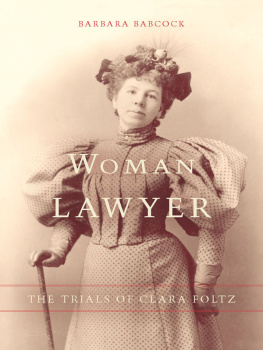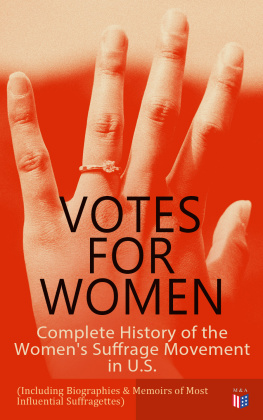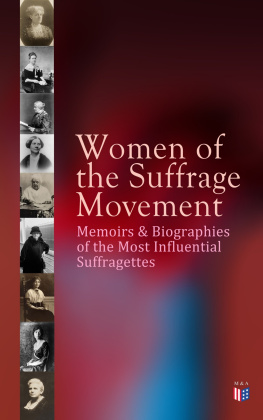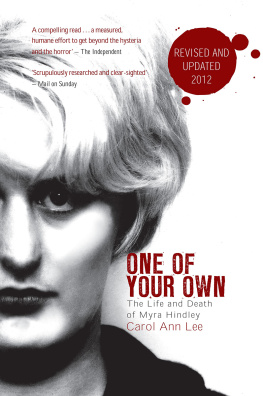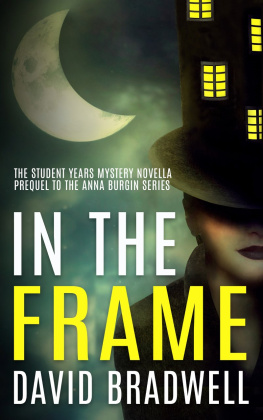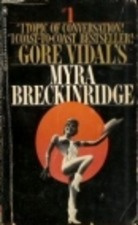Americas First Woman Lawyer
4
These Letters Could Not Be Published Bradwells Granddaughter Disposes of the Bradwell-Lincoln Correspondence
Before departing for France, Mrs. Lincoln showered the Bradwells not only with gratitude and praise, but also with many gifts, remembrances of herself and President Lincoln. Among these were the pen used by the president in signing the Emancipation Proclamation, his Definition of Democracy in his own handwriting, a bloodstone seal presented to President Lincoln by the Sultan of Turkey, an oil painting that had hung in the Lincoln home at Springfield, and one of Mrs. Lincolns most prized and valuable personal possessions, a gold chain bracelet set with pearl that had been a birthday present to Mrs. Lincoln from her husband. Thus, Mrs. Lincolns generosity extended not only to herself but also to the two people who had been willing to spend their time, effort, and considerable abilities to secure her freedom.
The praise and gratitude that Mrs. Lincoln bestowed upon the Bradwells were in marked contrast to the rancor that she expressed toward her son. On June 19, 1876, four days after she was summarily declared sane, she wrote Robert an extraordinarily bitter and accusatory letter, which began curtly Robert T. Lincoln. After demanding the return of all her goods, she continued:
I am now in constant receipt of letters from my friends denouncing you in the bitterest terms six letters from prominent respectable Chicago people such as you do not associate with. Send me all that I have written for you have tried your game of robbery long enough.
And robbery it was, at least with respect to the correspondence between Mary Todd Lincoln and Myra Bradwell. All of Mrs. Lincolns biographers have been aware that such correspondence once existed, and all have puzzled over its mysterious disappearance. One biographer has written, [Mrs. Lincolns]letters to the Bradwells have vanished
While Turners speculation is undoubtedly correct, it explains only the destruction of the letters that Myra and James wrote to Mrs. Lincoln, and which then either devolved to or were confiscated by Robert. Turners conjecture provides no explanation for the disappearance of the letters that the Bradwells received from Mrs. Lincoln. Certainly that correspondence would not have devolved to Robert, nor could it have been stolen by him. Or could it have been? The answer, sadly, is yes, fifty years after it came into existence. Among the Bradwell documents recently discovered by this author were affidavits, contracts, letters, and memoranda, which, when pieced together, explain how Robertor, rather, the attorneys for his estatewere able to obtain and undoubtedly destroy the letters that Mrs. Lincoln had written to Myra.
As has been previously discussed, but also allowed herself to be bullied into selling Mary Todd Lincolns letters to the Robert Lincoln estate, whose attorneys undoubtedly destroyed them. To make matters worse, after the death of Myra Pritchard, her executrix destroyed all the copies that the granddaughter had made of the Bradwell-Lincoln correspondence.
As J. G. Turner has hypothesized, it is almost a certainty that Robert Lincoln destroyed all the letters that Myra and James had written to his mother, letters written before, during, and after Mary Todd Lincolns confinement in the insane asylum. It is not clear whether Robert personally attempted to gain access to and get rid of the letters that the Bradwells received from his mother. But that seems to have been the case, for after Roberts death, his wife and children pursued the matter with great tenacity and ultimately obtained and probably destroyed the last remnants of that correspondence.
Robert Lincoln died in 1926. At that time Myras granddaughter, Myra Pritchard, was in possession of thirty-seven letters written by Mrs. Lincoln to Myra relating to the formers confinement and release from the insane asylum. Myra Pritchard desired to fulfill the wishes of her mother and grandmother to have Mrs. Lincolns letters published so that history would, perhaps, record her not as a ranting lunatic, but rather as a much misunderstood woman who had been treated shamefully by her son and subsequently rescued by her friend, Myra Bradwell. In pursuit of that goal, Myra Pritchard entered into a contract with Liberty Weekly, a New York periodical, in which Myra Pritchard agreed to write a serial article concerning the life of Mary Todd Lincoln, the wife of Abraham Lincoln, based upon certain letters passing between Mrs. Lincoln and [James and Myra Bradwell].
Myra Pritchard did in fact write the manuscript of some twelve or fifteen chapters setting up in narrative form the contents of numerous Mary Lincoln letters constituting an exchange of correspondence between her and the Bradwell family. On the very next day, Myra Pritchard sold the letters and the manuscript to the attorneys for Robert Lincolns family for $22, 500. Undoubtedly, those materials were promptly destroyed.
Why, one might ask, would Myra Pritchard have bothered to prepare a manuscript of twelve to fifteen chapters on a matter of great historical significance, secure a publisher, and then nullify the arrangement? Greed may have supplied part of the motivation, but only a small part. The major reason, if one believes her own statement, was that the attorneys for Robert Lincolns family convinced her that:
These letters could not be published due to an old law which reads that the literary properties in letters belong to those who wrote them and to their succeeding heirs and not to the people who received them. Mrs. Woodrow Wilson created a precedent some years ago when Colonel House wished to publish some of President Wilsons letters to him and refused her consent. (Emphasis added)
Myra Pritchards sale of Mrs. Lincolns letters to the attorneys for the Robert Lincoln family was, to put it kindly, very foolish. While it is true that, under the law as it then existed, the literary properties in the letters belonged to those who wrote them and their succeeding heirs and not the people who received them, that meant only that Myra Pritchard could not have published the letters verbatim. Certainly, she could have written a narrative account of Myra Bradwells relationship with Mrs. Lincoln and could have drawn heavily on Mrs. Lincolns letters for documentation. Apparently Myra Pritchard did not even consult with an attorney, although as a woman of financial means she certainly could have afforded to do so. The result is that very important historical documents have been lost to posterity.
One can speculate that the attorneys for the Robert Lincoln family paid off not only Myra Pritchard but also the publishers with whom she had contracted. Those publishers seemed extremely amused at the circumstances surrounding the cancellation of their contract. Shortly after the publication agreement was terminated, the vice president of the publishing company wrote to one of his colleagues:
As I havent Mrs. Pritchards address, I can not return to her direct this copy of her contract. All I can say is that it sews her up as tight as a drum. In point of fact, I think if she is apprehended reading a book about Lincoln, or mentioning his name or the name of his lady, she is likely to subject herself thereby to imprisonment for life, if indeed not summary execution.
But Myra Pritchard was not sewn up nearly as tightly as either the publishers or the lawyers believed. In spite of her contractual promise that she would make no copies of said letters or of said manuscript,
But it was only the manuscript that she destroyed, not the copies of Mary Todd Lincolns letters. Those were retained by the executrix until 1951 when, having been convinced that they were worthless, she burned them also.
The catalyst for this latter action was a man named Oliver Barrett, one of the foremost collectors of Lincoln items in the country. In 1947 Mr. Barrett had on display at the Library of Congress a body of materials that purported to be the complete collection left by Robert Lincoln. Mr. Barrett believed that if copies of Mary Todd Lincolns letters to the Bradwells surfaced, this would decrease the value of his Robert Lincoln collection. Thus, in a letter written to Myra Pritchards executrix by Mr. Barretts attorneys, they counseled:
Next page

